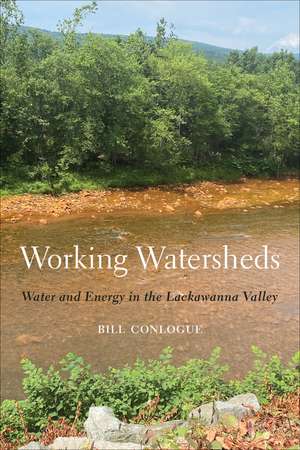Working Watersheds: Water and Energy in the Lackawanna Valley
Autor William Conlogueen Limba Engleză Paperback – 14 noi 2024
Offering a fresh way to think about the Anthropocene, this distinctive history of water and coal in the Lackawanna Valley discusses how both water abundance and scarcity might play out as global temperatures rise. Working Watersheds is designed to trigger debates about the nature of history, the significance of literature, and the importance of linking person, place, and planet in an era of climate change.
| Toate formatele și edițiile | Preț | Express |
|---|---|---|
| Paperback (1) | 159.48 lei 3-5 săpt. | +14.96 lei 7-11 zile |
| Temple University Press – 14 noi 2024 | 159.48 lei 3-5 săpt. | +14.96 lei 7-11 zile |
| Hardback (1) | 538.57 lei 6-8 săpt. | |
| Temple University Press – 14 noi 2024 | 538.57 lei 6-8 săpt. |
Preț: 159.48 lei
Nou
Puncte Express: 239
Preț estimativ în valută:
30.52€ • 33.14$ • 25.64£
30.52€ • 33.14$ • 25.64£
Carte disponibilă
Livrare economică 01-15 aprilie
Livrare express 18-22 martie pentru 24.95 lei
Preluare comenzi: 021 569.72.76
Specificații
ISBN-13: 9781439926178
ISBN-10: 1439926174
Pagini: 206
Ilustrații: 15
Dimensiuni: 152 x 229 x 18 mm
Greutate: 0.36 kg
Editura: Temple University Press
Colecția Temple University Press
ISBN-10: 1439926174
Pagini: 206
Ilustrații: 15
Dimensiuni: 152 x 229 x 18 mm
Greutate: 0.36 kg
Editura: Temple University Press
Colecția Temple University Press
Recenzii
“Focused on the unique water systems and human culture of the Lackawanna Valley, Working Watersheds is innovative and informative. Conlogue’s entirely unique perspective brings the reader insights to this place and its stories while also demonstrating a way of viewing—a template—that might be applied to any site that blends natural and human tales. In this merging of disciplinary approaches, we find an entirely unique portrait of how to understand our industrial heritage. Acknowledging the implications of mining and development allows readers to come full circle, and Conlogue is our best guide to understand eastern Pennsylvania—where it has been and where it will go in the future.”—Brian C. Black, Distinguished Professor of History and Environmental Studies at Penn State Altoona, and author of Petrolia: The Landscape of America’s First Oil Boom
“Pennsylvania’s Lackawanna Valley exemplifies what it means to be a working watershed with a fraught history of coal mining and fracking, but its qualities are both unique and universal. Bill Conlogue’s eloquent exploration of his home territory provides a model for historical and literary meditation on the meaning of place that could be applied anywhere on earth. This multiscalar, multidisciplinary, authoritative, and intimate narrative, which vividly exposes the inextricability of water and energy, offers an impressive example of how the environmental humanities can help us recognize our troubled past and imagine the possibility of a better world.”—Scott Slovic, Oregon Research Institute, and founding president of the Association for the Study of Literature and Environment
“Pennsylvania’s Lackawanna Valley exemplifies what it means to be a working watershed with a fraught history of coal mining and fracking, but its qualities are both unique and universal. Bill Conlogue’s eloquent exploration of his home territory provides a model for historical and literary meditation on the meaning of place that could be applied anywhere on earth. This multiscalar, multidisciplinary, authoritative, and intimate narrative, which vividly exposes the inextricability of water and energy, offers an impressive example of how the environmental humanities can help us recognize our troubled past and imagine the possibility of a better world.”—Scott Slovic, Oregon Research Institute, and founding president of the Association for the Study of Literature and Environment
Notă biografică
Bill Conlogue is Professor of English at Marywood University and author of Undermined in Coal Country: On the Measures in a Working Land, Here and There: Reading Pennsylvania's Working Landscapes, and Working the Garden: American Writers and the Industrialization of Agriculture.
